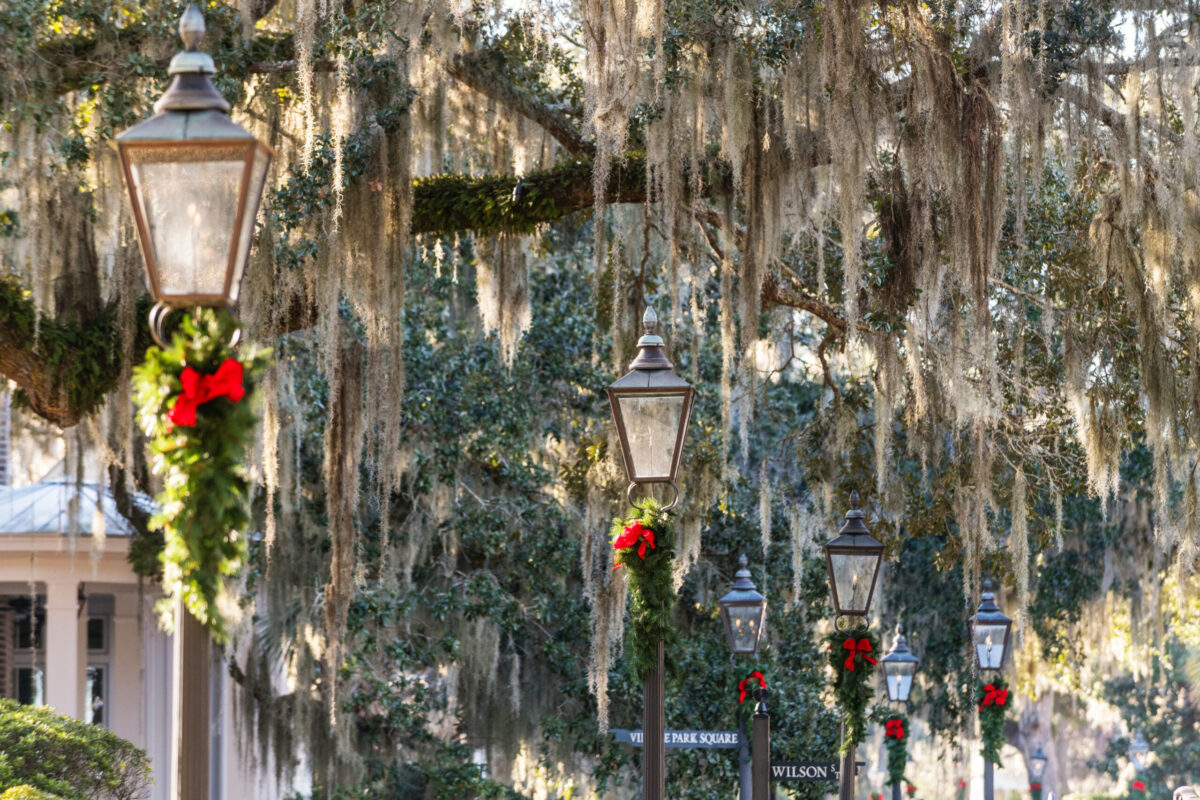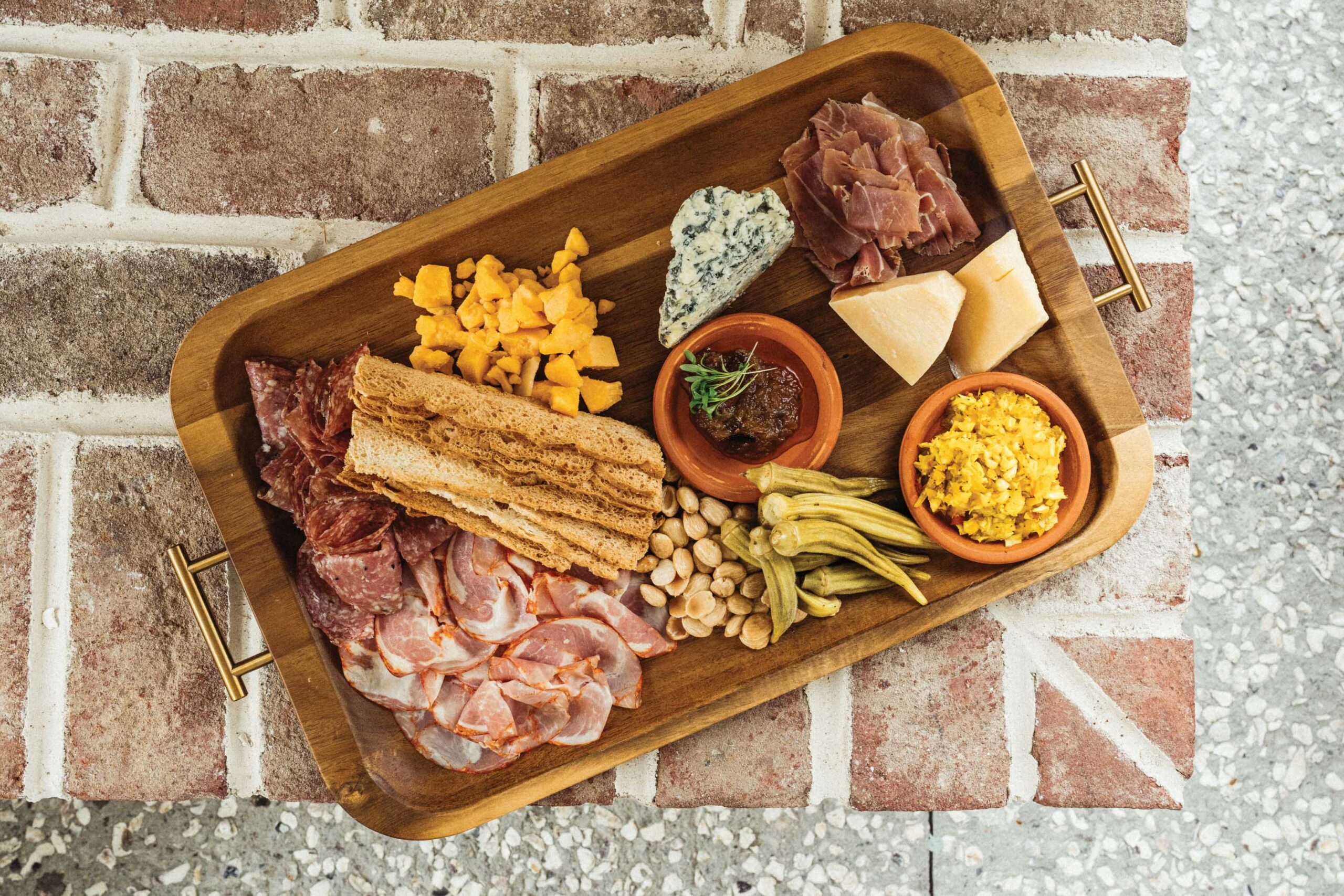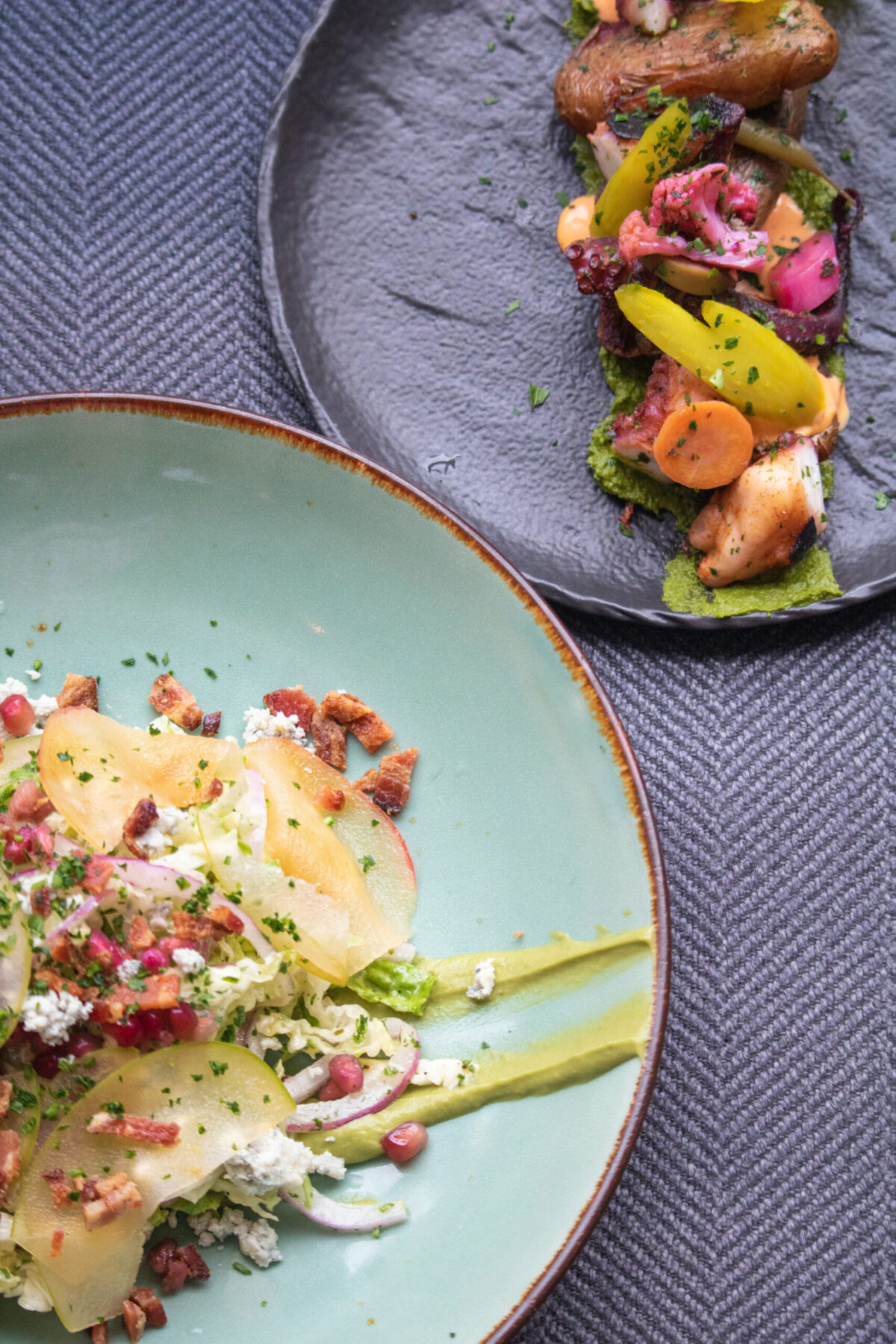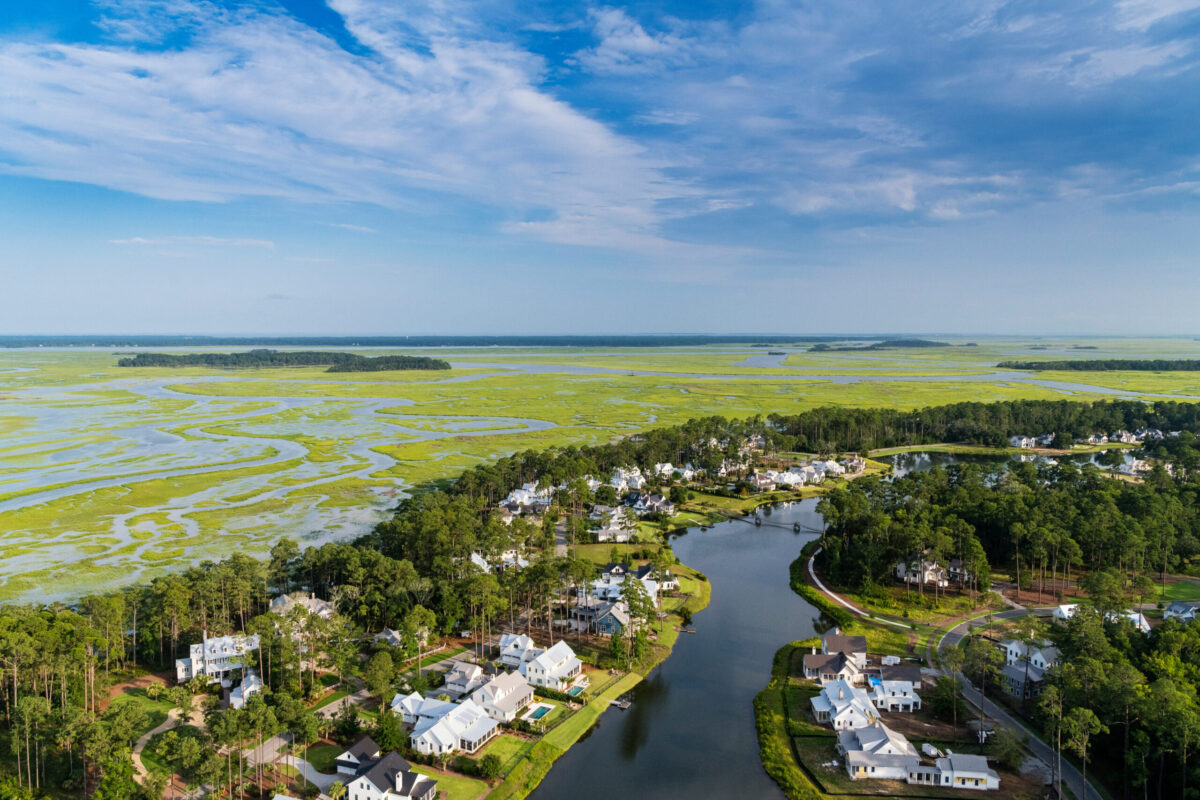Palmetto Bluff Real Estate Company Sales Office
Office Hours
Monday-Friday 9am - 5pm
Saturday 9am - 4pm
Sunday 12 - 4pm
Saturday 9am - 4pm
Sunday 12 - 4pm
If you know where to look, you’ll find that sometimes the most amazing things are hiding in plain sight all around you.
As you traverse the Lowcountry, do you look twice at the humble Yaupon holly? Do you even know what a Yaupon holly is?
The Yaupon (Yo-Pawn) is that innocuous little bush you see in landscaping all around the Lowcountry. Sometimes as a dwarf varietal filling in a bare spot in a flower bed, sometimes as a small tree bordering the marshlands of our maritime forests, the Yaupon holly is that wiry, shrub-like plant with the red berries that you’ve probably already ignored three or four times today.
But with all due respect to the Palmetto tree’s role in the defense of Charleston during the Revolutionary War, this little plant has probably done more for our area history than any other vegetation.
Before the Europeans had ever heard of South Carolina, there were the many Native American tribes that called it home. And those natives knew better than to overlook the Yaupon. By boiling the leaves and twigs, they found that they could create a tea that somehow left them feeling more alert and revived. They gave this tea names like “asi,” “black drink,” or “big magic,” and it soon earned it a spot in important cultural rituals of several tribes.
But the big magic of the Yaupon holly isn’t spiritual, it’s chemical. That’s because the Yaupon holly is the only caffeinated plant that grows naturally in the United States. The natives had essentially discovered Red Bull.
And for a time in the pre-history of North America, Yaupon was a hot commodity. Archaeological digs in California and Canada have turned up plenty of Yaupon leaves, thousands of miles from the Southeastern marshes where they grow, which means that the “big magic” was big business for the traders among the coastal Indian tribes.
The knowledge of this miraculous energy-boosting leaf wasn’t lost when the natives were eventually forced out by the white settlers, either. As wars from French and Indian to Civil raged in the ensuing centuries, Southerners deprived of tea and coffee due to the conflict were quick to take to the forests in search of Yaupon holly.
Unfortunately, those white settlers that didn’t recognize the black drink for the antioxidant-rich proto-Cappuccino it was ended up spreading some pretty unfortunate stereotypes. The scientific name for the plant, Ilex Vomitoria, came from colonial naturalists observing a few of the native rituals, some of which commonly ended with participants, well, vomiting.
Because of this, and because eating the berries can make you sick, these early naturalists assumed that Yaupon was an emetic. For the record, it is not. But you know how these rumors get started; one early colonial naturalist says it and the next thing you know we’re putting the word vomit in the plant’s name and doing everything we can not to drink it.
This false assumption about Yaupon has lasted centuries now, but that could all change if Lou Thomann has anything to say about it.
“I took a nature trip to Ossebaw Island, with this naturalist named John ‘Crawfish’ Crawford,” Thomann said, explaining his first encounter with the plant. “We walked by a yaupon tree and he said this was what the natives made a ‘tea-like beverage’ out of. So I said let’s make some. I tried it and loved it.”
That encounter with the tea on a quiet island 20 miles from Savannah led Thomann to a revelation, not to mention loads of historical research on what this tea once was and where it went.
“The Yaupon holly is truly a lost American treasure,” said Thomann. “It’s part of this fantastic native and early Colonial story that’s just gone.”
As the founder of ASI Yaupon Tea, Thomann has been bringing back the black drink, bottling it for a new generation, and spreading the gospel of this once-lost spiritual beverage.
By harvesting and cultivating new growth from wild-picked leaves and twigs, Thomann has been able to take this ancient ritual that inspired him so much and manufacture it, if such a term can be applied to what ASI does.%GALLERY%“We’re propagating wild species from the woods,” he said. Through trial and error, ASI has been able to perfect its recipe by determining the precise conditions in the wild that produce the most caffeine and antioxidants.
So we know its historical background and we know its chemical properties, but the million dollar question still remains: how does it taste?
“It does have a unique flavor,” said Thomann. “The Spanish called it Indian chocolate because of its sweetness… It tastes like a tea, not totally foreign to the tea palate.”
That’s not to say that there isn’t room to have a little fun with the flavor. ASI brews up five varieties, and in true “tree-to-table” fashion, each derives its sweetness from a source that grows naturally in the wilds of the Southeast. The traditional tea is just straight Yaupon, but other blends get a boost from honey sourced from local apiaries, muscadine and scuppernong grapes, and Aronia berries (what the locals call chokeberries).
As a note to mixologists, these local flavors aren’t the only thing you can spike your black drink with. “It’s a great mixer. I’ve tried it in bourbon and it tastes great.”
Thomann is even bringing a little bit of that history to bear as he moves forward on some of his newer blends, citing a historical lost recipe that ASI is feverishly trying to unearth and replicate.
“Tomochichi served it to James Oglethorpe here in Savannah, because they often served the drink socially,” said Thomann. “Oglethorpe loved it and developed a recipe. There are references to this recipe but we can’t find the recipe itself, so we’re looking for it now.”
You foodies out there might already be brainstorming ways to incorporate something as uniquely local as this into your next recipe. Come on – a sustainable tea made from leaves that are hand-picked off of a wild bush that only grows in the maritime swamps of certain regions of the South? That’s every food trend in existence right now; surely that can be used to class up your next meal.
Thomann’s one step ahead of you.
“Tea is becoming an interesting ingredient in cocktails and foods,” said Thomann. “There’s an emergence of appreciation right now for tea in cooking. We want people to let us know what they’re doing with it.”
So far, Thomann notes, someone has been able to create an extract of ASI tea and has used it in barbecue sauce. Right away the taste buds reel just imagining the subtle notes of an earthy local tea mingling with a spicy vinegar Carolina sauce over slow cooked pork.
At this point you’re either already drafting up recipes or you’re wondering what this has to do with Palmetto Bluff. After all, this guy is all the way in Savannah.
Remember how we mentioned that you’ve probably already ignored this plant three or four times today? It turns out, Thomann is always on the lookout for new sources of Yaupon leaves. And Palmetto Bluff is rife with them.
Palmetto Bluff Conservancy Director Jay Walea saw the potential for collaboration right away.
“Knowing how much we have out here and what a cool story it is — as a sustainability story alone it fits right in with the Palmetto Bluff story — it was a perfect fit from the start,” said Walea.
The plan is to have ASI come in to Palmetto Bluff and start scouring the maritime forests for Yaupon hollies growing in those “precise conditions” Thomann mentioned before. Just based on sheer volume available, there should be quite a few plants in that sweet spot. So don’t worry, they won’t be raiding your flower beds.
Instead, they’ll be way out in the woods where the picking season must be perfectly timed so as not to overlap with hunting season.
“They won’t start picking until around January when deer season ends, and they’ll keep going until March when turkey season starts,” Walea said.
Naturally, this arrangement between ASI and the Conservancy will be a two-way street. In exchange for a new source of Yaupon leaves, ASI will lead nature tours that preach the gospel of Yaupon and let people get out into the woods and go native.
“Because of the Conservancy’s mission of being proper stewards of the land, they see us educating people, leading lectures and going out into the woods picking,” said Thomann.
“Plus I can wrap lectures around Yaupon tea, and have people make their own Yaupon,” added Walea.
As if that wasn’t enough, there’s even scuttlebutt about using the leaves and twigs harvested here in the creation of a signature Palmetto Bluff Yaupon tea.
“It’s about same strength of strong black tea, but with a little afterbite to it, a little earthy undertone,” said Walea of his experiences with the black drink. But you’ll be able to find out for yourself when the first bottles of Palmetto Bluff teas start showing up on shelves, in bourbon and over pork soon.
You want local? How much more local does it get than being able to say the mixer in your cocktail was harvested just outside your door?
So here’s to the humble Yaupon holly, the little overlooked plant with a potent chemical pick-me-up and the fascinating backstory. And here’s to the people who are making sure that story gets told.
“Once you get into the story and understand this thing, you’re hooked,” said Thomann. “People are so passionate about it. There’s so much to tell.”
Written by Barry Kaufman
Photography by Rob Kaufman

How to Spend a Lowcountry Christmas at Palmetto Bluff There's no better way to start anticipating the holidays than by making plans to spend time with family and friends. Now that the holiday season has arrived, many look forward to embracing the Christmas sp...

Explore 130 August Lane at Montage Residences Nestled in the heart of the Lowcountry, the Montage Residences at Palmetto Bluff offer an unparalleled blend of elegance, exclusivity, and Southern charm. This private collection of homes sits amidst the lush land...

Experience Winter Wildlife This Season at Palmetto Bluff The Lowcountry is a wondrous place to live, not only for its breathtaking scenery and historical significance but also for the wildlife that inhabits it. Winter wildlife in South Carolina includes a wid...

As summer’s heavy air fades into fall’s cool breezes, our resident wildlife are busy preparing for another Lowcountry winter.In the fall, eastern wild turkeys move into habitats mostly dominated by hardwood trees such as oaks, hickories, beeches, cypresses, tu...

The Arts Initiative at Palmetto Bluff hosted an unforgettable evening in the May River Chapel this past October with our visiting Artist in Residence, multi-Grammy-winning singer-songwriter Clay Ross, founding member of the Billboard chart-topping band Ranky T...

This year’s FLOW FEST was an unforgettable celebration of art, music, and community spirit. Held on a stunning autumn afternoon by the May River, our third annual arts and music festival, hosted by The Arts Initiative at Palmetto Bluff, brought together friend...

Recipes by Palmetto Bluff Club Executive Chef Beth Cosgrove Photographs by Lawson Builder Pickling Through the Centuries Pickling dates back over four thousand years to ancient Mesopotamia. Early picklers discovered that soaking perishable foods in brine or v...

Martin’s Journey to the Palmetto Bluff Racquet Club At Palmetto Bluff, tennis and pickleball enthusiasts are fortunate to have a dedicated and passionate leader guiding the vibrant racquet sports scene. Martin Aviles, Director of Racquet Sports at the Wilson ...

Palmetto Bluff’s farm offers a unique opportunity for residents and guests to experience the Lowcountry’s rich agricultural heritage. The farm provides fresh, seasonal produce and herbs used in restaurants across the Bluff, bringing the concept of farm-to-tabl...

Palmetto Bluff Homes for Sale on the Inland Waterway Tucked within the serene beauty of Palmetto Bluff, homes along the inland waterway offer unparalleled access to nature and luxurious living. With private docks, expansive outdoor spaces, and custom designs,...
Learn about the Palmetto Bluff Conservancy and how we keep the vision of our land in place.
On land or water, there is an ever-evolving variety of activities.
We do not attempt to independently verify the currency, completeness, accuracy or authenticity of the data contained herein. All area measurements and calculations are approximate and should be independently verified. Data may be subject to transcription and transmission errors. Accordingly, the data is provided on an “as is” “as available” basis only and may not reflect all real estate activity in the market”. © [2023] REsides, Inc. All rights reserved. Certain information contained herein is derived from information, which is the licensed property of, and copyrighted by, REsides, Inc.